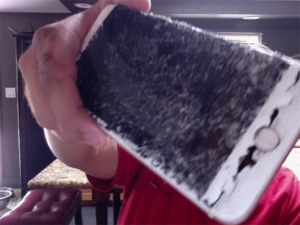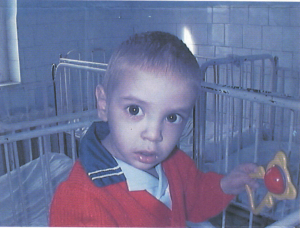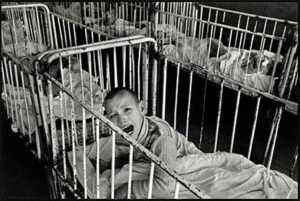Sitting Under the Redwoods
Did I create the monster lovingly known as my son? Or is this a case of nature vs. nurture? Should I smash my iPhone into the side of the building? Or just turn it off?

Antioch University – LA
These are some of the questions swirling in my mind as I sit under towering California redwoods, in a Zen-like courtyard at Antioch University, Los Angeles. It’s a beautiful December day, and I’m on a break between classes I’m attending toward earning my MFA in Creative Writing. Other than my son’s constant texts with demands for one thing or another, peppered with insults—it’s pure heaven.
* * *
I decided to obtain an MFA just for me. My educational experience before this was for my parents. I went to college and earned a B.A. in Philosophy. I didn’t necessarily want a degree in Philosophy, but when one is studying to be a priest in a Catholic Seminary—you don’t argue. I still, to this day, can’t stand to get into a Socratic debate with anyone, about anything. While writing under these redwoods won’t necessarily pay the bills right away, I can dream that one day it will. I know that now.
What I don’t know is how to convince my nineteen-year-old son, Ciprian (Chip for short) that there is a life outside of his bedroom, and beyond his Xbox. I don’t know how to convince him to go to college, get a job, or even to begin to take some responsibility for his life. I also don’t know how to stop him from calling me and my husband faggots if we refuse one of his demands. He would rather engage us in the only thing he apparently learned at High Tech High—to Socratically debate the crap out of everything he believes he deserves or wants, and to hurl insults if he doesn’t win. So, as I sit under these redwoods, Chip resorts to texting me his newest demand.
Chip: “What’s your fucking issue? You need to buy me a new car unless you wanna continue to screw yourself paying all this money for a buggy car.”
 Yesterday, it was his broken iPhone (the third one in six months) and the day before that it was a one-thousand-dollar list of new clothes. The day before that it was for money he needed to replace a driver’s license he lost. I have taken to not immediately engaging him on the reasons he should begin to take care of what he has, or even (god forbid) obtain these things on his own through a (gasp) job. He is truly brilliant when it comes to Socratic debates, and I would be screwed. I instinctively want to revert to how my dad handled all of the problems he incurred with me when I was this age, and lecture the hell out of him. But as I write this, and goosebumps run up and down my body—I know better. When I was young, all my dad’s lectures over the years served only one purpose—to make me feel there was no way I could ever be good at anything because, in his words, “I was just a stupid boy.” As I aged, he still lectured me but came to respect my decisions. Or, at least he let me believe that he did.
Yesterday, it was his broken iPhone (the third one in six months) and the day before that it was a one-thousand-dollar list of new clothes. The day before that it was for money he needed to replace a driver’s license he lost. I have taken to not immediately engaging him on the reasons he should begin to take care of what he has, or even (god forbid) obtain these things on his own through a (gasp) job. He is truly brilliant when it comes to Socratic debates, and I would be screwed. I instinctively want to revert to how my dad handled all of the problems he incurred with me when I was this age, and lecture the hell out of him. But as I write this, and goosebumps run up and down my body—I know better. When I was young, all my dad’s lectures over the years served only one purpose—to make me feel there was no way I could ever be good at anything because, in his words, “I was just a stupid boy.” As I aged, he still lectured me but came to respect my decisions. Or, at least he let me believe that he did.

Ciprian (Chip) age 1 1/2 Vaslui, Romania Orphanage
So, before you “get up in my grill” (as Chip loves to say) about my unlettered parenting style, and how I raised my son, you should know that he came wired this way. When we adopted him at two years of age from Romania, he refused to be put into a stroller, or wear a cap to keep his shaved head warm. Upon meeting him for the first time, the large brown eyes dominating his gaunt face instantly told us where we stood in his pecking order of needs. He had learned to live without a parent, but his basic other needs and wants would have to be fulfilled, or there would be hell to pay. If he needed his diaper changed, and we didn’t act fast enough, he would do it himself, and find a way to let us know of his displeasure. As he grew older and started to string enough English words together, he would insult us if we didn’t give him exactly what he wanted. Ultimately, he called 911 from a wall mounted telephone to talk to them about those needs and demands.
Chip: “Hello, is this mommy?”
911: “Where are your parents?”
Chip: “I’m on the toilet, they won’t give me anything I want.”
911: “Are you OK, do you need the police?”
Chip: “No, I just want a big TV for my room.”
At first, we found this humorous, but when the 911 operator asked if we wanted a visit from CPS for abandoning him on the toilet and to “help us out,” I knew we had to figure out a better way to allow Chip to express his needs.
* * *

Stock Photo – Romanian Orphan
Today you hear little about “Romanian Orphans.” In 2001, four months after we adopted Chip, the EU forced the stoppage of all adoptions from Romania due to what they perceived as corruption and child abuse within the system. If Romania was ever to become a member of the European Union, they needed to comply. This left many children caught in a system that would seal their fates in life. Chip was one of the lucky ones—he got out before the doors slammed shut. Today there are still over 19,000 children living in orphanages in Romania. Conditions have improved, but sensory deprivation still takes its toll. There are too many children and too few caring adults who are willing to pick up a crying baby. They cry because they’re hungry. Because they want to be held. Because they want to be loved.
* * *
Regardless of origin, adopting a child from a foreign country is a bit like playing Russian roulette. For every five children who find the inner strength to survive emotionally, there is one that will blow your mind. That “one” is our son. He is bigger than life, reminding us from time to time that if we don’t like how he acts, we should never have adopted him. He is also, despite his colorful use of personal nouns and adjectives to make a point, attached to both of our hips. Other than those times when I would just like to be alone with my thoughts—under these redwoods, selfishly writing my prose—I wouldn’t want it any other way. Who wants a sweet boy, or girl, who sits with a pencil in hand and does his or her homework without complaint? One that says “Yes, Papa, I love you!” If I had a child like that, I would probably sleep with one eye open fearing that their sweet exterior would soon crack, and the real “Chuckie” underneath would rear its ugly head one night with a knife in hand. I may gnash my teeth, from time to time, over how my child treats me—but I always know where I stand with him. Through it all I know he deeply loves both of us, as we deeply love him. There is no doubt in my mind.
* * *
I have never known a day to go by that Chip hasn’t had a complaint or called me, or my husband, a name. Some are legitimate; like “Hey stupid, I need my diaper changed,” but others are the rantings of someone who is trying to find his voice—and his way through life. They are the rantings of someone who at birth was diagnosed with failure to thrive—when his efforts to continue life, upon being abandoned by his mother, ultimately ceased—and was dumped into an orphanage to die. They are the rantings of someone who had the cradle turned upside down on top of him—so he wouldn’t crawl away—instead of lovingly placing him down in it for a nap. They are the rantings of someone who got nothing but porridge every day, and one small chunk of meat on the weekend—if he was good. They are the rantings of someone who only knows how to scream out his needs—instead of patiently waiting, or planning like the rest of us who whisper our needs to ourselves.

Chip and Daisy 2010
Over the seventeen years, he has been in our life, we’ve explored all forms of therapy, pills, etc. to “normalize” him in our eyes. I tried to instill religion, rationalize with him about life, and occasionally yelled at him until I was red in the face, elevating my blood pressure too high for a man my age. Nothing seems to faze him, and nothing stops him from trying to get what he wants. While the orphanage did not fulfill his early childhood need to be loved, to be touched, it did give him an almost herculean strength never to give up asking.
Yesterday he informed me that he was destined to make it on his own; that he refuses to work an 8 to 5 like the rest of us losers. I told him that was a good plan—if he didn’t like eating, but even that didn’t make a dent in his protective emotional armor. I wish that I could say that it made a scratch.

Photo of friend – downtown San Diego
The good news is that Chip has an incredibly large heart. He loves animals, his family, and friends. He protects them at all costs. There has never been a parent who met him that didn’t make a point of going out of the way to tell us how polite and generous he is. He is also very talented. He’s a fantastic photographer. He composes computer beats that he is trying to get in front of several rap artists around the country. He can design logos and t-shirt designs like a graphic artist in a Madison Avenue advertising firm. He has done this all on his own. He has always refused help. He avoids the easy road in any aspect of life. These traits may be, unfortunately for him, what he received on the nurture side from my husband and me. Chip has had a front-row seat watching as Larry, and I struggle to make a living through our creativity—Larry, a talented floral designer, and me—a frustrated writer.
* * *
What I would like him to ultimately do in life doesn’t matter. Should we as parents try and impose our will on our children? Should we expect that they will follow in our footsteps and become a “mini-me?” My parents, because of their religious convictions, wanted that for me. So, I spent the early part of my life pursuing their dream to become a priest, and the other part working myself to the bone in one hotel after another—instead of taking time to explore my first love—writing. It wasn’t until my mom laid dying that I finally received permission to do what I wanted to do. Her last words to me were: “Remember, Girard, life is short—make sure you take time to stop and smell the roses.” Even with those words of empowerment, it took me another twenty years to believe in myself. I don’t want Chip following in those footsteps.
* * *

Chip 2017
As I am writing this, amid the sounds of wind rustling through the redwoods and my fellow students quietly chatting around me, another text has come through from Chip with a photo of an ad for a beautiful 2017 red, convertible Camaro LT.
Chip: “You need to get me this car, it’s only $24,000.”
I haven’t responded. Nor will I immediately respond to his other texts for the new iPhone, the clothes, etc. While he refuses to learn, he has taught me that he still needs to shout out his demands from under his self-imposed living cradle. He intrinsically needs to be heard for his survival. These diatribes are more about letting the world know that he is still alive than they are about insulting us or actually getting what he is demanding. Eventually, as I have done many times in the past, I will sit next to him, discuss the way he asks for things, and talk about the names he calls us. He will apologize, and admit that life frustrates him. I will tell him that he is not alone.
While I fear for him on the road ahead, I’ve learned from my own experiences that it is his road, not mine. So, for now, I will acknowledge his rantings and continually encourage him to find better ways to express his frustration. Oh, and to also stop and smell the roses, or at the minimum—to find his own grove of redwoods to sit beneath. One hopefully without cellular service.

Jerry (Girard) Parent
Jerry Parent is a current MFA candidate in Creative Writing at Antioch University Los Angeles. He is serving as Lunch Ticket’s Flash Prose Editor. He earned his B.A. in Philosophy from St. John’s Seminary College, and currently resides in San Diego with his husband, son, two dogs and one cat. He and his husband own one of San Diego’s oldest floral companies, Adelaide’s, located in the village of La Jolla.





